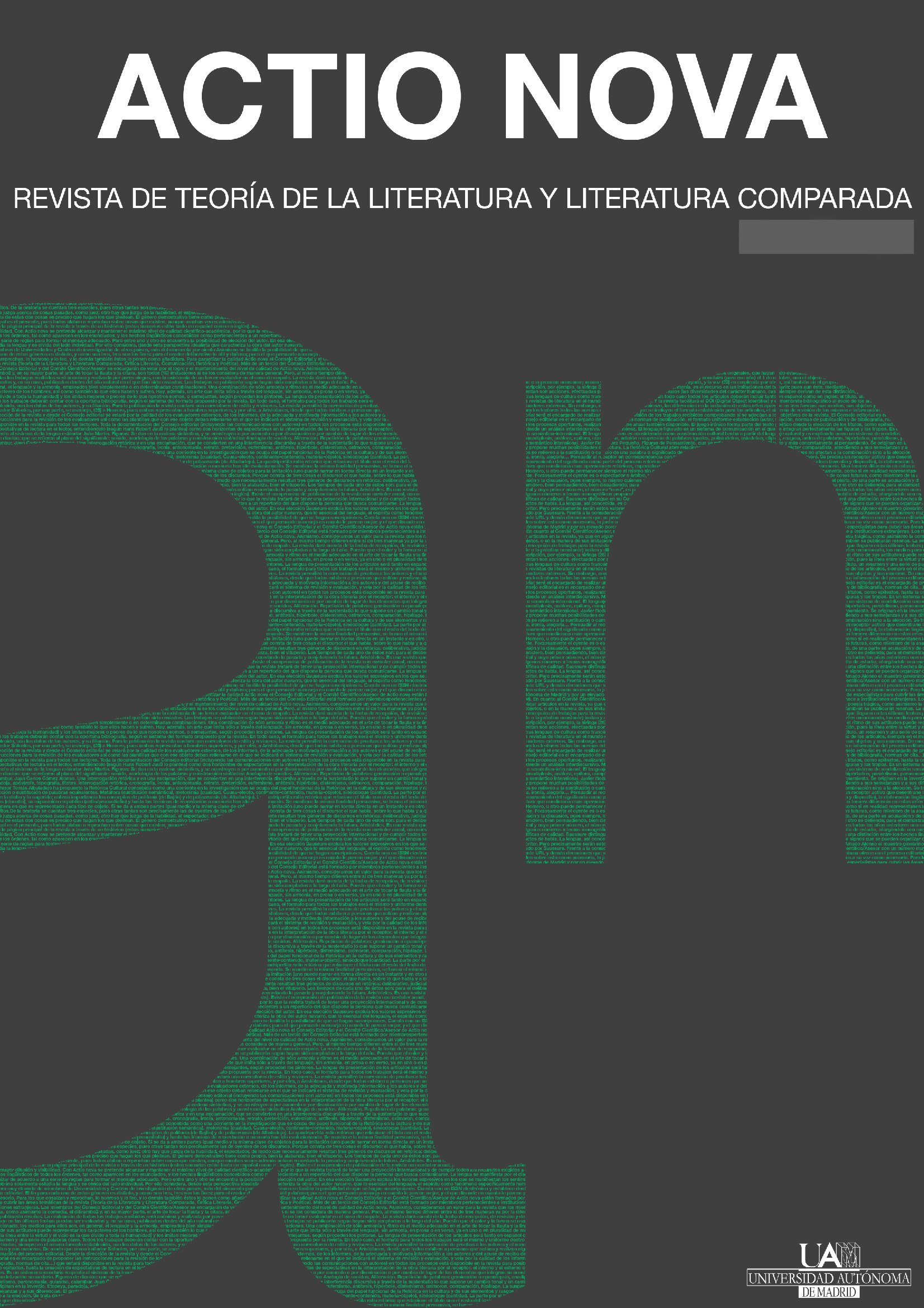«We believe only in what is well told». Narrative negotiations of postfactual discourse in «Blanco nocturno» by Ricardo Piglia
Keywords:
Post-truth, neoliberalism, capitalism, conspiracy theories, paranoia, Ricardo Piglia, Blanco nocturnoCopyright (c) 2024 Lina Wilhelms

This work is licensed under a Creative Commons Attribution-NonCommercial 3.0 Unported License.
Abstract
The article analyses Ricardo Piglia’s crime novel Blanco nocturno (2010) in the context of the post-truth era, arguing that Piglia’s work explores the economic and political background of a growing culture of mistrust towards official truths. It highlights the role of neoliberalism in the emergence of this post-truth culture and how economic processes, such as financialization and globalisation, can lead to an epistemological crisis. The novel Blanco nocturno is a prime example of how individuals who cling to the promises of modernity can adopt a paranoid attitude in the tension between supposed freedom and actual loss of control.
Downloads
References
Adorno, Theodor W. (2003): «Lectura de Balzac», en Theodor W. Adorno: Notas sobre literatura, Madrid, Akal: 136-153.
Baraibar Norberg, Matilda (2020): The Political Economy of Agrarian Change in Latin America. Argentina, Paraguay and Uruguay, Cham, Palgrave Macmillan.
Berg, Edgardo H. (2020): «La ineluctable modalidad de lo visible (breves notas sobre Blanco nocturno de Ricardo piglia [sic]», en Raquel Fernández Cobo (ed.): Ricardo Piglia, The Master. Lector, novelista y profesor, Almería, Editorial Universidad de Almería: 121-138.
Bolsi, Alfredo; Norma Meichtry (2006): «Economía de mercado y sociedades tradicionales en la generación de la pobreza en el Norte Grande argentino», en ESTUDIOS, 19: 65–89.
Boltanski, Luc (2012): Énigmes et complots. Une enquête à propos d’enquêtes, Paris, Gallimard.
Caballero, Juan (2013): «Ricardo Piglia’s Blanco nocturno (2010). A Paranoid History of Neoliberalism», in: Polifonía, 3: 120-131.
Deleuze, Gilles; Félix Guattari (1972/73): Anti-Œdipe. Capitalisme et schizophrénie, Paris, Éditions de Minuit.
Dove, Patrick (2012): «Literary Futures. Crime Fiction, Global Capitalism and the History of the Present in Ricardo Piglia», en: A contracorriente, 10: 18-36.
Duraffour, Annick; Pierre-André Taguieff (2017): Céline, la race, le juif. Légende littéraire et vérité, Paris, Fayard.
Eagleton, Terry (2011): «Moll’s Footwear», en London Review of Books, 33, URL: https://www.lrb.co.uk/the-paper/v33/n21/terry-eagleton/moll-s-footwear (último acceso: 15/10/2024).
Enroth, Henrik (2023): «Crisis of Authority. The Truth of Post-Truth», en International Journal of Politics, Culture, and Society, 36/2: 179-195.
Farrell, John C. (2007): Paranoia and Modernity. Cervantes to Rousseau, Ithaca, NY, Cornell University Press.
Hora, Roy (2010): «La crisis del campo del otoño de 2008», en Desarrollo Económico, 50: 81-111.
Horkheimer, Max; Theodor W. Adorno (1998): Dialéctica de la Ilustración. Fragmentos filosóficos, Madrid, Trotta.
Kelman, David (2012): Counterfeit politics. Secret Plots and Conspiracy Narratives in the Americas, Lewisburg: Bucknell University Press.
Maltz, Hernán (2016): «Las fronteras lejos de los límites. Sobre Blanco nocturno de Ricardo Piglia», en Jaime Muñoz
Vargas; José Salvador Ruiz-Méndez; Gabriel Trujillo Muñoz (eds.): Fuegos cruzados. Ensayos sobre narrativa policiaca de fronteras, University of Colorado/Universidad Autónoma de Baja California, Editorial Artificios: 17-32.
Mandel, Ernest (1986): Delightful Murder. A Social History of the Crime Story, Minneapolis, University of Minnesota Press.
Melley, Timothy (2000): Empire of Conspiracy. The Culture of Paranoia in Postwar America, Ithaca, London, Cornell University Press.
Oxford Languages (2016): «Word of the Year 2016», URL: https://languages.oup.com/word-of-the-year/2016/ (último acceso: 22/10/2024).
Piglia, Ricardo (2001): Crítica y ficción, Barcelona, Anagrama.
Piglia, Ricardo (2005): El último lector, Barcelona, Anagrama.
Piglia, Ricardo (2010): Blanco nocturno, Barcelona, Anagrama.
Piglia, Ricardo (2014): «Teoría del complot», en: Ricardo Piglia: Antología personal, Buenos Aires, Fondo de Cultura Económica: 99–118.
Piglia, Ricardo (2015): La forma inicial. Conversaciones en Princeton. Buenos Aires, Eterna Cadencia.
Piglia, Ricardo; Vicente Undurraga (2011): «Las novelas me llevan mucho tiempo. Entrevista con Vicente Undurraga», en The Clinic, 12: 16-19.
Rebossio, Alejandro (2016): «Los 14 años de la batalla entre Argentina y los ‚fondos buitre‘», El País (29/02/2016), https://elpais.com/internacional/2016/02/25/argentina/ 1456414614_219161.html (último acceso: 24/06/2023).
Redacción Clarín (1997): «El precio de la tierra alcanzó el valor más alto de la historia», Clarín (26/09/1997), https://www.clarin.com/economia/precio-tierra-alcanzo-valor-alto-historia_0_rkTG3Kx-0Yg.html (último acceso: 20/10/2024).
Rodrik, Dani (2011): The Globalization Paradox. Why Global Markets, States, and Democracy Can’t Coexist, Oxford, Oxford University Press.
Schmid Noerr, Gunzelin; Eva-Maria Ziege (2019): «70 Jahre Dialektik der Aufklärung», en: Gunzelin Schmid Noerr; Eva-Maria Ziege (eds.): Kritik der regressiven Vernunft. Beiträge zur „Dialektik der Aufklärung“, Wiesbaden, Springer: 1-20.
Tocco, Fabricio (2022): Latin American Detectives Against Power. Individualism, the State, and Failure in Crime Fiction, London: Lexington Books.
Watt, Ian (1996): Myths of Modern Individualism. Faust, Don Quixote, Don Juan, Robinson Crusoe, Cambridge, Cambridge University Press.
Weixler, Antonius (2021): «Make Control Great Again. Zur narrativen Konstruktion ‚eingeweihten Wissens‘ in Verschwörungserzählungen», en Antonius Weixler, Matei Chihaia, Mati?as Marti?nez, Katharina Rennhak, Michael Scheffel y Roy Sommer (eds.): Postfaktisches Erzählen? Post-Truth - Fake News - Narration, Berlin/Boston, De Gruyter: 127-156.
Vigueras Hernández, Juan (2015): Los fondos buitres, capitalismo depredador. Actores políticos, judiciales y económicos de un negocio global, Buenos Aires, Clave Intelectual.

